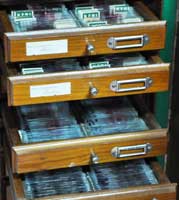
Quick Links
- Arboretum
- Bambusetum
- Cane & Palmetum
- Herbarium
- Orchidarium
- Soil museum
- Wildlife Museum
- Teak Museum
- Nature Trail
- Thematic Displays
- Medicinal Plants
- Butterfly Garden
- Insect collection
- Laboratories
- Plant Propagation
- Networks & Helpline
- Monitoring Facilities
- Centralised Facilities
Other Facilities
Other Groups
Xylarium
 Xylarium is a collection of authenticated wood specimens that is well-curated and accessible to the scientific community. Xylarium is mainly intended to display the wood collections for scientific research, teaching, environmental education and other xylarium programmes. The word 'xylarium' has been originated from Greek word 'xylon' meaning 'wood' and is used as 'wood collection with proven and certified accuracy'. Wood collections may seem to be primarily of interest to wood anatomists, botanists, and foresters, but they hold specimens and information applicable to many other fields such as antiques, furniture restoration, forensic timber identification, history, ecology, palaeontology, archaeology, conservation biology, dendroecology, and climate change studies, etc. As a service to the wood anatomical community, these collections will provide sectioning blocks for research projects, especially systematic wood anatomical studies, wood identification, etc. Since India is a net importer of industrial wood from abroad and most of the species are unfamiliar to the user agencies nor to the common man, proper diagnostics of the timber species signifies the importance of xylarium in recent times especially those CITES listed species.
Xylarium is a collection of authenticated wood specimens that is well-curated and accessible to the scientific community. Xylarium is mainly intended to display the wood collections for scientific research, teaching, environmental education and other xylarium programmes. The word 'xylarium' has been originated from Greek word 'xylon' meaning 'wood' and is used as 'wood collection with proven and certified accuracy'. Wood collections may seem to be primarily of interest to wood anatomists, botanists, and foresters, but they hold specimens and information applicable to many other fields such as antiques, furniture restoration, forensic timber identification, history, ecology, palaeontology, archaeology, conservation biology, dendroecology, and climate change studies, etc. As a service to the wood anatomical community, these collections will provide sectioning blocks for research projects, especially systematic wood anatomical studies, wood identification, etc. Since India is a net importer of industrial wood from abroad and most of the species are unfamiliar to the user agencies nor to the common man, proper diagnostics of the timber species signifies the importance of xylarium in recent times especially those CITES listed species.
KFRI Xylarium was established in 1979 and currently has a collection of 715 specimens, representing 572 species from 320 genera. The samples represented Australia, Brazil, Canada, China, Germany, India, Japan, Myanmar, Netherlands, Philippines, Portugal, the United States of America, and the United Kingdom. The xylarium database has detailed records including family names, scientific names, accession numbers, collection dates, collector(s) names, xylarium numbers of voucher specimens, country of origin, altitude, latitude, longitude, habit, habitat, and various notes on collection or accession. Almost all wood specimens have corresponding voucher xylarium specimens deposited in the KFRI Xylarium with the same accession number unless they are foreign wood samples collected on an exchange basis. The dimensions of the KFRI xylarium samples are standardized at 10x6x1 cm for small specimens and 16x10x2 cm for larger specimens. KFRI's Xylarium is indexed in the IAWA Index Xylariorum 4.1 (2016), a directory of Institutional Wood Collections from around the World. To enhance the diversity of wood samples, KFRI has a few xylarium samples (Indian species) available for mutual exchange, except for permanent slides.
Our scientists, Drs. K.M. Bhat, K.V. Bhat, P.K. Thulasidas, Sreekumar V.B., and Shwetha have contributed to the collection and enrichment of KFRI xylarium. KFRI is committed to making this important collection more accessible to students, researchers, foresters, etc., and now the KFRI xylarium is available online at https://www.xylarium.in.
The digital version of KFRI Xylarium will help the global scientific community and wood industry to identify timber species based on their wood characteristics. This will promote research, education, and conservation efforts related to plant biodiversity. In summary, this online database will play a crucial role in advancing scientific knowledge, biodiversity conservation, and sustainable resource management.
Contact: Wood Science & Technology Division
Kerala Forest Research Institute
Peechi P.O, Thrissur District, Kerala - 680653, India.
Tel: +91-487-2690283
e-mail: xylarium@kfri.res.in
